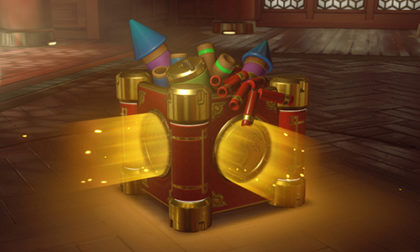ESRB Says that Loot Boxes in Video Games Don’t Qualify as Gambling
The holiday season approaches and with it will come the purchases of boatloads of video games. There are often dozens of big-budget games released every month; just last month we saw the release of NBA2K, Marvel vs. Capcom: Infinite, Destiny 2, FIFA 18, and Dishonored: Death of the Outsider. The highly-anticipated Middle-Earth: Shadow of War just came out this week and the newest South Park and Wolfenstein games will be available later in October. Call of Duty: WWII and Star Wars Battlefront II are the ones gamers are looking forward to in November. Most or all such games – “AAA” games, as they are called – will cost $50 or $60. But in addition to the purchase price, some include in-game stores where players can buy “loot boxes,” or mystery packages of in-game items. And it is these loot boxes that have been the topic of debate in the gaming community for several months, as many called on the Entertainment Software Rating Board (ESRB) to classify games with loot boxes as gambling. The ESRB has responded and has said that loot boxes are not gambling.
The ESRB is a non-profit organization that assigns ratings to video games. Games are reviewed by the ESRB and given a rating of eC (Early Childhood), E (Everyone), E 10+ (Everyone 10 and older), T (Teen), M (Mature 17+), or A (Adults Only 18+). Games are also given content descriptors such as “violence” or “sexual content,” and descriptions of interactive elements, such whether or not a player will end up interacting with other players.
Games with loot boxes (we’ll use “loot boxes” a catch-all term – different games call them different things) would have some sort of notation by the ESRB that in-game purchases are available.

Loot boxes in the game Fortnite take the form of llama pinatas. And they talk.
Image credit: fortnite.wikia.com
As mentioned, loot boxes are items that can be purchased for in-game currency or real money, depending on the game, and contain items that can be used in the game. Players do not know exactly what will be in the loot box before it is opened, just that there will be something in it and the item(s) can vary in rarity. Some games have loot boxes that contain items that are only used for cosmetic purchases. Overwatch, one of the most popular games in the world right now, for instance, only has cosmetic loot boxes. They contain things like character costumes, player logos, voice lines, and sprays. They are fun to open – and can be earned through play without purchase – but are completely unnecessary in order to succeed in the game (I, personally, am grinding to earn loot boxes currently, as the Halloween event just started and there are some fun costumes available).
Not everybody loves those kinds of loot boxes, but where the controversy really comes is with games where the loot boxes contain items that actually aid the player. Examples of items might be more powerful weapons, costumes that increase a player’s abilities, or an item that grants special powers. In these cases, the loot boxes can become a very important part of the game, as if someone doesn’t open any (or opens very few), he or she can end up at a disadvantage compared to other players.
Loot boxes definitely FEEL like gambling. You spend your in-game currency or real money, let the random number generator do its thing, and hope you get some amazing item. I know when I open a loot box in Overwatch (note: I have never purchased one), I am always hoping for that “Legendary” costume (called a “skin”) that both looks cool and costs a solid chunk of in-game coins if I wanted to buy it straight-up.
And when the loot box opens only to contain junk, there is that temptation to just…buy…one…more. It is very much like a slot machine.
But the ESRB says loot boxes are not gambling. An ESRB spokesperson told the website Kotaku:
SRB does not consider loot boxes to be gambling. While there’s an element of chance in these mechanics, the player is always guaranteed to receive in-game content (even if the player unfortunately receives something they don’t want). We think of it as a similar principle to collectible card games: Sometimes you’ll open a pack and get a brand new holographic card you’ve had your eye on for a while. But other times you’ll end up with a pack of cards you already have.
And that, in a nutshell, is the big difference between what FEELS like gambling and what technically IS gambling. When I bet five dollars on a hand of blackjack, I could (and likely will) come away with nothing. I could lose money or I could win money. I am gambling. With a loot box, I don’t know what I’m going to get, but I know I am going to get SOMETHING, even if it is not the something that I want. I am not gambling, I am purchasing a mystery item.
Gaming companies definitely don’t want aspects of their games to be considered gambling, either, as the ESRB would have to rate than as “A” for “Adult,” which would result in lower sales numbers.
It is very similar to the recent collectibles trend. A couple months ago, I bought a Garbage Pail Kids “blind box” for my son. It cost a few bucks and inside was a vinyl Garbage Pail Kids figure. We didn’t know which figure it was, but we knew there was one in there. But that didn’t feel like gambling. It just felt like a mystery box.
Now, this is not to say that loot boxes and other microtransactions don’t take advantage of our brain’s desire to collect, to find out what’s next, to want to see what’s behind door number two. And when gamers are asked to pay for more stuff when they already paid for the game, well, that doesn’t feel very good.
Now, the flip side of this is that in the internet age of gaming, customers have come to expect game developers to add content to a game on a somewhat regular basis. When I was a kid, my dad would buy me a Nintendo game and that would be that. The game is the game, no more, no less. Now developers can push updates to players daily if they so choose. Overwatch, to go back to that example, has added major content once a month this year. And it is the money they make from loot boxes, season passes, and extra downloadable content that helps pay for all of this.
Today, PC Gamer quoted a report by monetization services company Digital River called “Defend Your Kingdom: What Game Publishers Need to Know About Monetization & Fraud.” The report said that last year, “.…a quarter of all digital revenue from PC games with an upfront cost came from additional content.”
“Consumers are less willing to pay $60 for a boxed game and instead choose titles with a steady stream of new content,” the report noted. “Publishers seek to meet these expectations and have adopted a ‘games as a service’ model, releasing fewer titles over time while keeping players engaged longer with regular updates and add-ons.”
Featured image credit: us.battle.net



















COMMENTS